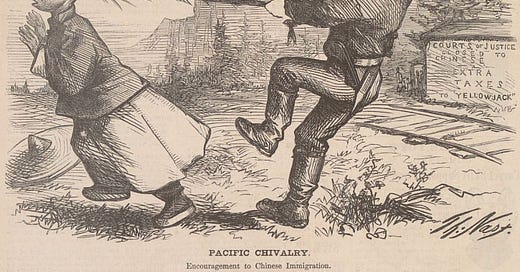"The West's Chinese" by Mark Twain,1860s
"They are a harmless race when white men either let them alone or treat them no worse than dogs."
Of course there was a large Chinese population in Virginia [City]—it is the case with every town and city on the Pacific coast. They are a harmless race when white men either let them alone or treat them no worse than dogs; in fact they are almost entirely harmless anyhow, for they seldom think of resenting the vilest insults or the cruelest injuries. They are quiet, peaceable, tractable, free from drunkenness, and they are as industrious as the day is long. A disorderly Chinaman is rare, and a lazy one does not exist. So long as a Chinaman has strength to use his hands he needs no support from anybody; white men often complain of want of work, but a Chinaman offers no such complaint; he always manages to find something to do.
He is a great convenience to everybody—even to the worst class of white men, for he bears the most of their sins, suffering fines for their petty thefts, imprisonment for their robberies, and death for their murders. Any white man can swear a Chinaman’s life away in the courts, but no Chinaman can testify against a white man. Ours is the “land of the free”—nobody denies that—nobody challenges it. (Maybe it is because we won’t let other people testify.) ...
All Chinamen can read, write and cipher with easy facility—pity but all our petted voters could. In California they rent little patches of ground and do a deal of gardening. They will raise surprising crops of vegetables on a sand pile. They waste nothing. What is rubbish to a Christian, a Chinaman carefully preserves and makes useful in one way or another. He gathers up all the old oyster and sardine cans that white people throw away, and procures marketable tin and solder from them by melting. He gathers up old bones and turns them into manure. In California he gets a living out of old mining claims that white men have abandoned as exhausted and worthless—and then the officers come down on him once a month with an exorbitant swindle to which the legislature has given the broad, general name of “foreign” mining tax, but it is usually inflicted on no foreigners but Chinamen. This swindle has in some cases been repeated once or twice on the same victim in the course of the same month—but the public treasury was not additionally enriched by it, probably....
They are a kindly disposed, well-meaning race, and are respected and well treated by the upper classes, all over the Pacific coast. No Californian gentleman or lady ever abuses or oppresses a Chinaman, under any circumstances, an explanation that seems to be much needed in the East. Only the scum of the population do it—they and their children; they, and, naturally and consistently, the policemen and politicians, likewise, for these are the dust-licking pimps and slaves of the scum, there as well as elsewhere in America.
From Roughing It by Mark Twain, 1872, available on Amazon*
Classic Travel Tales on Facebook
More travel stories from Mark Twain:
Mark Twain’s story “A Sleepless Night” from A Tramp Abroad (1880)
Mark Twain’s story “An Awkward Encounter” from A Tramp Abroad (1880)
Mark Twain’s story “By Train in India” from Following the Equator (1897)
Mark Twain’s story “Journey to Benares” from Following the Equator (1897)
Mark Twain’s story “Tarantulas on the Loose” from Roughing It (1872)
Mark Twain’s story “Lost in a Blizzard” from Roughing It (1872)
Mark Twain’s story “A Disturbing Incident” from Following the Equator (1897)
Mark Twain’s story “Athens by Stealth” from The Innocents Abroad (1869)
Mark Twain’s story “Carson City 1861” from Roughing It (1872)
Mark Twain’s story “Lake Tahoe” from Roughing It (1872)
Mark Twain’s story “An Archangel” from Life on the Mississippi (1883)
*As an Amazon Associate we earn a bit from qualifying purchases.
Image: “Pacific Chivalry” by Thomas Nast, Harper’s Weekly, August 7, 1869, public domain.



